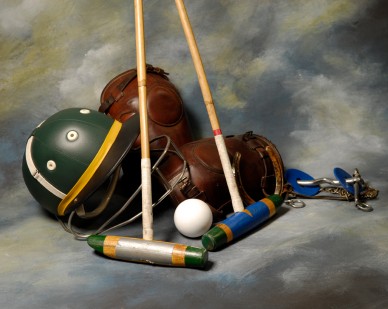
Recently, for the first time in years, I tried my hand at polo again. I had played a few times before as part of a Pony Club team, and although I loved it, in all honesty, we were pretty rubbish. So it was quite a nice surprise to be able to actually hit the ball.
The session was organised by a couple of third year vet school students in the hope of kick-starting the all-new Glasgow University Polo Club.
When we’d finished for the day, we were asked to untack the polo ponies, put their rugs on and turn them out into the appropriate paddock or barn. Since we all had at least some level of riding experience, this was not a problem. However, the assumption that, because we’re vet students, we’d know what we were doing did get me thinking.
I’ve had horses for years, so tasks such as tying a quick-release knot, putting on a bridle or bandaging legs are as natural to me as tying my shoelaces. But is that the case for some of my fellow students, whose equine experience only stretches as far as the one horse handling practical session we had last year?
That’s when the importance of pre-clinical EMS becomes clear.
I heard a third year student today make a comment along the lines of “pre-clinical EMS is just for the fun stuff”. While this may have been just an innocently flippant remark, I think this does highlight the fact that perhaps some students don’t fully appreciate how vital it is to gain certain skills that can only be acquired through experience.
 As vets (and sometimes as students), we will be expected to be competent handlers of the animals we will be working with. Experience is the only way to gain confidence and be able to feel at ease with the animals themselves and the associated equipment (e.g. headcollars or a cattle crush). It also allows us to learn how to relate to farmers, horse owners and other types of people that will essentially be our future clients.
As vets (and sometimes as students), we will be expected to be competent handlers of the animals we will be working with. Experience is the only way to gain confidence and be able to feel at ease with the animals themselves and the associated equipment (e.g. headcollars or a cattle crush). It also allows us to learn how to relate to farmers, horse owners and other types of people that will essentially be our future clients.
It is a fool’s mistake to think that being shown how to do something once at vet school means that we are immediately competent. It is up to us to reinforce the learning of these skills while on pre-clinical EMS placements – and it is absolutely essential to gain as much experience as possible by simply being around the animals that will become our livelihood.
Although some students have the attitude that only the clinical years are important, they are forgetting that the pre-clinical stage is the foundation for those clinical bricks be supported by. You could be the best clinician in the world and know everything there is to know in your field, but what good is that if you can’t get anywhere near the horse you’re trying to diagnose because you don’t know how to use a twitch?

Leave a Reply